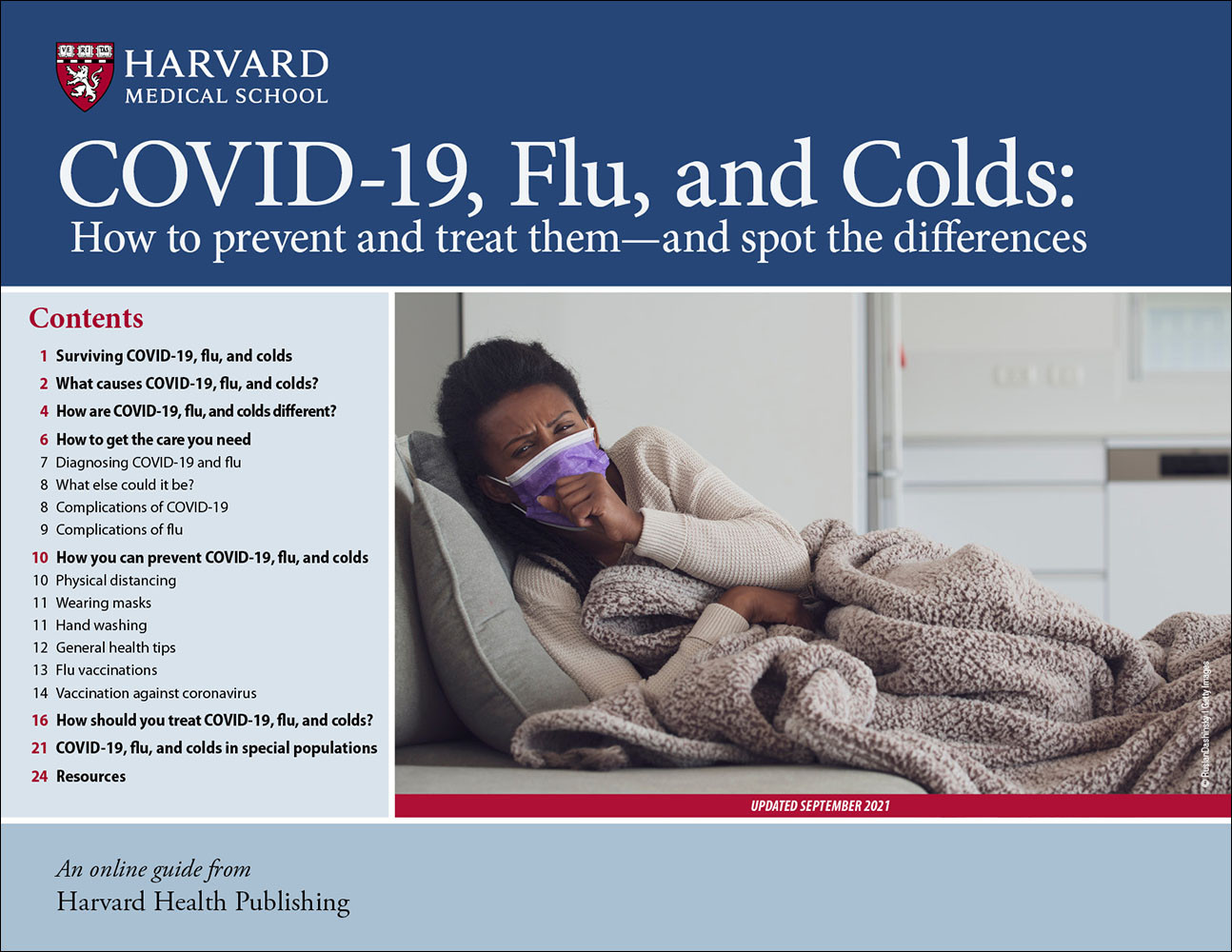Fall vaccination roundup
Even if you're exhausted from pandemic-related vaccinations, it's still important to stay up to date on all of your shots.
- Reviewed by Anthony L. Komaroff, MD, Editor in Chief, Harvard Health Letter; Editorial Advisory Board Member, Harvard Health Publishing

As the COVID-19 pandemic drags on, with vaccination requiring boosters, it can be easy to forget about vaccines that guard against other illnesses. But vaccines are more important than ever as the years pass, because your immune system weakens with age. "You can't fight off infections as well as you used to," says Dr. Suzanne Salamon, associate chief of gerontology at Harvard-affiliated Beth Israel Deaconess Medical Center. "If you have medical conditions, they can make you even more vulnerable. So any vaccinations are helpful."
Talk to your doctor about whether you're up to date on vaccinations and boosters for COVID-19; tetanus, diphtheria, and pertussis (whooping cough), which are given together; hepatitis A; and the following illnesses.
Influenza
The CDC recommends getting your annual flu shot in September or October, but Dr. Salamon suggests waiting until November. "The flu shot loses about 7% of its effectiveness every month after you get it. But flu season generally doesn't arrive until December or January. So my warning is that you shouldn't get the shot too early," she says. If the flu season begins unusually early, however, you should get the shot sooner.
There are a few types of flu shots. Dr. Salamon advises getting whatever flu vaccine is readily available to you. "But if there's a choice, the latest recommendation for people 65 or older is to go with the high-dose flu shot over the regular dose," she says. "The high dose is four times stronger than the regular dose, and people 65 or older need more of a boost to get immunity."
People with heart, lung, or kidney disease are especially susceptible for flu complications. So are people who take medications that suppress the immune system. The flu shot may help reduce your risks, including the risk of heart disease from the flu (see "Ask the doctor").
Shingles
If you're 50 or older, you need two doses of the shingles vaccine (Shingrix), two to six months apart. Shingrix protects you against a reawakening of the varicella-zoster virus, which lies dormant in your nervous system after a case of chickenpox. The virus can emerge years later, causing a painful rash known as shingles. Even after the rash clears up, pain can last for years.
Getting the shingles vaccine not only protects you against a shingles outbreak, it also reduces your risk of debilitating chronic pain. The shots offer 90% protection for at least seven years. However, the shots can cause temporary symptoms. "The shingles vaccine can cause two or three days of flu-like symptoms, such as muscle pain, fatigue, or redness at the injection site," Dr. Salamon says. "But after all of the patients I've seen suffer from shingles and post-shingles pain, I tell my patients that the side effects of the vaccine are worth it."
You may hear that you don't need to get the Shingrix vaccine if you've had shingles, if you don't remember ever having chickenpox, or if you had an older version of the shingles shot (Zostavax, which is no longer available in the United States). None of that is true.
Finding and paying for vaccinationsYou can get vaccines from your doctor's office, a pharmacy, a health or travel clinic, or your local health department. Most private insurance policies cover all recommended vaccinations. Medicare vaccine coverage depends on your policy. For example, Part D usually covers all vaccines. Part B covers some of them. For more information, visit Medicare (health.harvard.edu/vax). |
Pneumonia
The pneumococcus bacteria can cause pneumonia, meningitis, and blood infection. You are protected from this by pneumococcal vaccines. Recommendations for these shots have changed a few times in the past decade, and they changed again this year with the FDA approval of two new vaccines: PCV15 (Vaxneuvance) and PCV20 (Prevnar 20). They are now the preferred vaccines, rather than PCV13 (Prevnar 13) and PPSV23 (Pneumovax 23).
The CDC now recommends that people ages 65 or older, as well as adults younger than 65 who are at high risk for pneumococcal disease, get either
- a single dose of PCV20
- a dose of PCV15, followed a year later by a dose of the older vaccine PPSV23.
If you already received PPSV23, you should get one of the new vaccines (PCV15 or PCV20) one year later.
If you already received PVC13, you should have gotten a "chaser" of PPSV23 a year later. If you didn't, the CDC says you should get it now; you don't need the new vaccines.
"It's very confusing, so get a record of the vaccines you receive from your primary care doctor," Dr. Salamon suggests. "Keep the information in a notebook, on your smartphone, or on your computer. And keep your primary care doctor up to date on any vaccines you may receive from other doctors."
Image: © Luis Alvarez/Getty Images
About the Author

Heidi Godman, Executive Editor, Harvard Health Letter
About the Reviewer

Anthony L. Komaroff, MD, Editor in Chief, Harvard Health Letter; Editorial Advisory Board Member, Harvard Health Publishing
Disclaimer:
As a service to our readers, Harvard Health Publishing provides access to our library of archived content. Please note the date of last review or update on all articles.
No content on this site, regardless of date, should ever be used as a substitute for direct medical advice from your doctor or other qualified clinician.
















